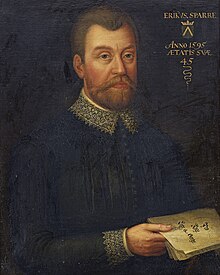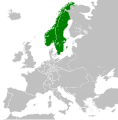Welcome to the Sweden Portal! | |||||||||

|

|

| |
Sweden, formally the Kingdom of Sweden, is a Nordic country located on the Scandinavian Peninsula in Northern Europe. It borders Norway to the west and north, and Finland to the east. At 450,295 square kilometres (173,860 sq mi), Sweden is the largest Nordic country and the fifth-largest country in Europe. The capital and largest city is Stockholm. Sweden has a population of 10.6 million, and a low population density of 25.5 inhabitants per square kilometre (66/sq mi); 88% of Swedes reside in urban areas. They are mostly in the central and southern half of the country. Sweden's urban areas together cover 1.5% of its land area. Sweden has a diverse climate owing to the length of the country, which ranges from 55°N to 69°N.
Sweden has been inhabited since prehistoric times, c. 12,000 BC. The inhabitants emerged as the Geats (Swedish: Götar) and Swedes (Svear), which together constituted the sea-faring peoples known as the Norsemen. A unified Swedish state was established during the late 10th century. In 1397, Sweden joined Norway and Denmark to form the Scandinavian Kalmar Union, which Sweden left in 1523. When Sweden became involved in the Thirty Years' War on the Protestant side, an expansion of its territories began, forming the Swedish Empire, which remained one of the great powers of Europe until the early 18th century. During this era Sweden controlled much of the Baltic Sea. Most of the conquered territories outside the Scandinavian Peninsula were lost during the 18th and 19th centuries. The eastern half of Sweden, present-day Finland, was lost to Imperial Russia in 1809. The last war in which Sweden was directly involved was in 1814, when Sweden by military means forced Norway into a personal union, a union which lasted until 1905.
Sweden is a highly developed country ranked fifth in the Human Development Index. It is a constitutional monarchy and a parliamentary democracy, with legislative power vested in the 349-member unicameral Riksdag. It is a unitary state, divided into 21 counties and 290 municipalities. Sweden maintains a Nordic social welfare system that provides universal health care and tertiary education for its citizens. It has the world's 14th highest GDP per capita and ranks very highly in quality of life, health, education, protection of civil liberties, economic competitiveness, income equality, gender equality and prosperity. Sweden joined the European Union on 1 January 1995 and NATO on 7 March 2024. It is also a member of the United Nations, the Schengen Area, the Council of Europe, the Nordic Council, the World Trade Organization and the Organisation for Economic Co-operation and Development (OECD). (Full article...)
Erik Larsson Sparre (born Erik Larsson; also known as Erik Gyllensparre, Eric Sparre, or Erik Sparre of Rossvik; 13 July 1550 – 20 March 1600) was a Swedish noble, statesman, diplomat, and political theorist who served as Privy Councilor from 1575 or 1576 until 1590 and Lord High Chancellor of Sweden from 1593 until his execution in 1600.
An esteemed orator and rhetorician, Sparre was considered the spokesman for the well-organized aristocratic opposition who advocated for parliamentary sovereignty in the Swedish government and is largely remembered for his contributions to Swedish law. His major written work – Pro lege, rege et grege ('For the Law, the King, and the People') – remains highly-regarded as an early defense of contractualism and earned him a reputation as the "father of Swedish constitutional law". Sparre's ideas were initially backed by John III of Sweden in order to check the ambitions of his brother, Duke Charles, but relations between Sparre and John soured when the nobility was able to overrule the king's prerogative during a stand-off in Reval. (Full article...)
Selected article -
Uppsala (Swedish pronunciation: [ˈɵ̂pːˌsɑːla] ; archaically spelled Upsala) is the capital of Uppsala County and the fourth-largest city in Sweden, after Stockholm, Gothenburg, and Malmö. It had 177,074 inhabitants in 2019.
Located 71 km (44 mi) north of the capital Stockholm, it is also the seat of Uppsala Municipality. Since 1164, Uppsala has been the ecclesiastical centre of Sweden, being the seat of the Archbishop of the Church of Sweden. Uppsala is home to Scandinavia's largest cathedral – Uppsala Cathedral, which was the frequent site of the coronation of the Swedish monarch until the late 19th century. (Full article...)
Did you know -

- ... that Sweden's richest man, Henry Dunker, willed his fortune to a foundation which funded improvements to the city of Helsingborg?
- ... that the first public Swedish orienteering competition, held in 1901, had two churches, Spånga and Bromma kyrka (pictured) as control points?
- ... that the Turning Torso skyscraper, is the tallest building in Sweden and the second tallest apartment building in Europe?
General images -
Harriet Sofie Bosse (19 February 1878 – 2 November 1961) was a Swedish–Norwegian actress. A celebrity in her day, Bosse is now most commonly remembered as the third wife of the playwright August Strindberg. Bosse began her career in a minor company run by her forceful older sister Alma Fahlstrøm in Kristiania (now Oslo, the capital of Norway). Having secured an engagement at the Royal Dramatic Theatre, the main drama venue of Sweden's capital Stockholm, Bosse caught the attention of Strindberg with her intelligent acting and exotic "oriental" appearance.
After a whirlwind courtship, which unfolds in detail in Strindberg's letters and diary, Strindberg and Bosse were married in 1901, when he was 52 and she 23. Strindberg wrote a number of major roles for Bosse during their short and stormy relationship, especially in 1900–01, a period of great creativity and productivity for him. Like his previous two marriages, the relationship failed as a result of Strindberg's jealousy, which some biographers have characterized as paranoid. (Full article...)
Categories
Main topics
Subdivisions: Counties of Sweden • Municipalities of Sweden • Provinces of Sweden

History: 1975 Occupation of the West German embassy • Ådalen shootings • Consolidation of Sweden • Early Swedish history • Enlightened Absolute Monarchy in Sweden • Early Vasa era • Industrialization of Sweden • Post-war Sweden • Prehistoric Sweden • Rise of Sweden as a Great Power • Suiones • Swedish Empire • Sweden after the Great Northern War • Sweden and the Winter War • Sweden during late 19th century • Sweden during World War II • Swedish allotment system • Swedish emigration to the United States • Union between Sweden and Norway
Politics: Alliance for Sweden • Constitution of Sweden • Foreign relations of Sweden • Government of Sweden • Parliament of Sweden • Riksdag • Swedish general election, 2006 • Swedish general election, 2010 • Swedish neutrality • Swedish welfare
Demographics: Education • Ethnic minorities • Languages • Religion • Subdivisions • Cities • People • Healthcare • Immigration
Culture: Cinema of Sweden • Cuisine of Sweden • Music of Sweden • Sports in Sweden • Swedish literature • Tourism in Sweden
Symbols: Flag • Coat of arms • National anthem
Things you can do
 |
Here are some tasks awaiting attention:
|
Wikipedia in Swedish
 |
There is a Swedish version of Wikipedia, the free encyclopedia. |
 |
WikiProjects
Featured and good content
Related portals
Northern Europe
Other countries












































